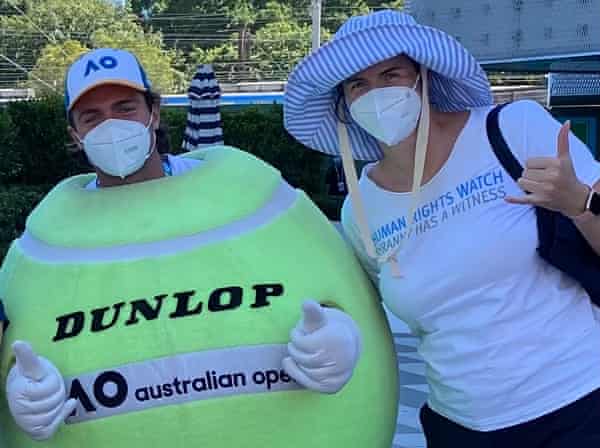I I have just returned to Sydney after two amazing days at the Australian Open. Dylan Alcott made me cry and stunt doubles for legends made me laugh. As I ran from court to court catching as many aces and plays as I could in 48 hours, the blazing Melbourne sun seemed a far cry from human rights concerns in Tibet, Hong Kong and Xinjiang.
But restrictions on the fundamental human right to freedom of expression, in both Australia and China, were also playing at the AO when two spectators were holding a banner and wearing T-shirts reading “Where’s Peng Shuai?” Their banner was confiscated and they were asked to remove the offending jerseys.
Whether she has consented to us taking up her cause or not, Chinese tennis player Peng Shuai is now a symbol of all human rights abuses in China as the 2022 Winter Olympics in Beijing kick off next week. and where the International Olympic Committee has been accused by at least one Uyghur human rights group to host a “genocidal Olympic Games”.
Days after the protesters were blocked, Tennis Australia did a flip, saying that while banners will still be banned (for safety), t-shirts are fine as long as “you don’t come like a mob to cause a riot…”. The focus of CEO Craig Tiley’s comments appears to be on intent, arguing that viewers intentionally causing disruption to the safety and comfort of other fans are not welcome.
The actual rules (when you look for them) in the AO ticket conditions of entry are clear: Prohibited items include “unauthorized” political or offensive items, such as clothing and banners. Certain conduct is also prohibited, including “political disruption.”
Unfortunately, the TA reversal and Tiley’s statements raise more questions. It is not clear who at TA decides what is political, offensive or disruptive. Now we also have to interpret what “intent to disturb” or “a mafia” is. It is also unclear why the T-shirts were initially banned and it was the political nature of “Where is Peng Shuai?” that it is related to the world of tennis or that one of the sponsors of the AO title is a Chinese liquor brand?
Without reading the terms and conditions, I donned a Human Rights Watch t-shirt at the AO that read “Tyranny Has a Witness,” racking up over 20,000 steps (personal record!) and showing my allegiance to Melbourne Park. Why wasn’t my shirt originally a problem?

Inconsistency in decision making and ignorance is the problem. If our rights are going to be curtailed, we must know why, and we must know how to remedy it when those in power make the wrong decision.
Sport is a battlefield where the competing interests of human rights, sponsorship dollars and host city/event legitimacy collide. Tennis Australia, along with all sports organizations, needs a human rights policy. They must also commit to the UN Guiding Principles on Business and Human Rights, which help organizations navigate these exact complexities.
Not all speech is free. We see private social media companies restricting speech that incites violence in the US, and striking the right balance at a major sporting event between “fan comfort and safety” and human rights is not easy.
FIFA, the governing body of world football, is the only international sports organization that incorporates human rights into the governance and operations of its sport. Its human rights policy notes that freedom of expression can be affected at events for security reasons, but only if it is “necessary and proportionate.” It is still difficult who decides this and how, but when a policy commits to respecting internationally recognized human rights, a framework exists to make sense of complex situations.
Tennis Australia’s terms and conditions appear to remain in place and still prohibit expression that is political, a sports fallacy backed by Rule 50.2 of the Olympic Charter which prohibits political, religious or racial demonstrations or propaganda at any Olympic venue, including athletes on the podiums and fans in the stands. Both organizations have not been able to legally justify how this expression can be restricted and the repeal of TA shows that it is almost impossible to decide what is political.
Governing the sport is difficult. Most of us are volunteers and there is a lot to do. Tennis Australia has 12 policies on its website to govern the game, including protection, anti-corruption and protection of members. The Tennis Australia reversal doesn’t seem to admit they were wrong, and I’d love to see them speak honestly about how difficult this is. If it’s about money, say so! That might not be the worst admission. Sport needs money for the equitable development of women and para sport. But if we engage meaningfully with athletes and use a human rights approach, we can feel more comfortable making difficult decisions.
After an inspiring weekend at the AO, it’s disappointing that my article deals with the shortcomings of sports. I’d rather write about my happy place: loving sports and remembering Alcott’s glow as he thanked the crowd for supporting him on his journey to build para sport and raise awareness for people living with disabilities. That’s why the sport is amazing on the pitch. Off the pitch, we have a long way to go.
www.theguardian.com
George is Digismak’s reported cum editor with 13 years of experience in Journalism